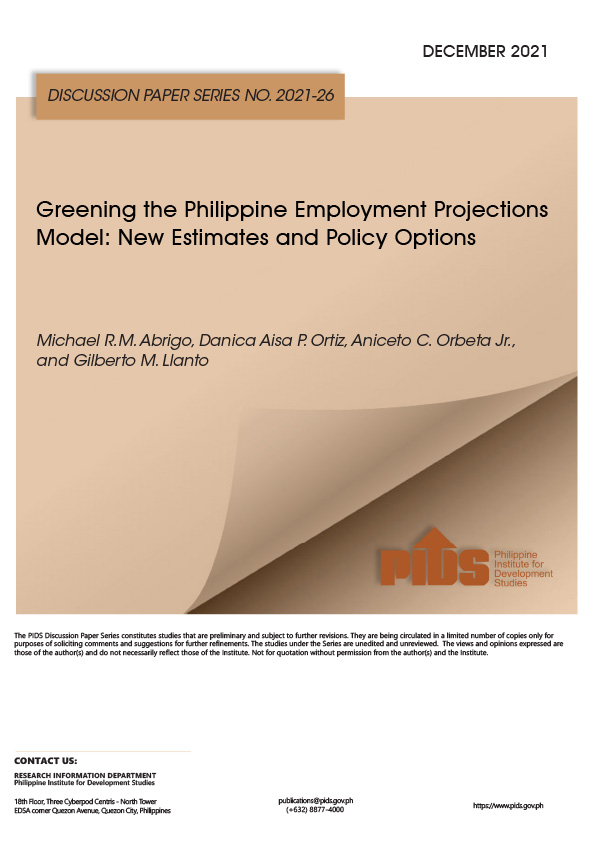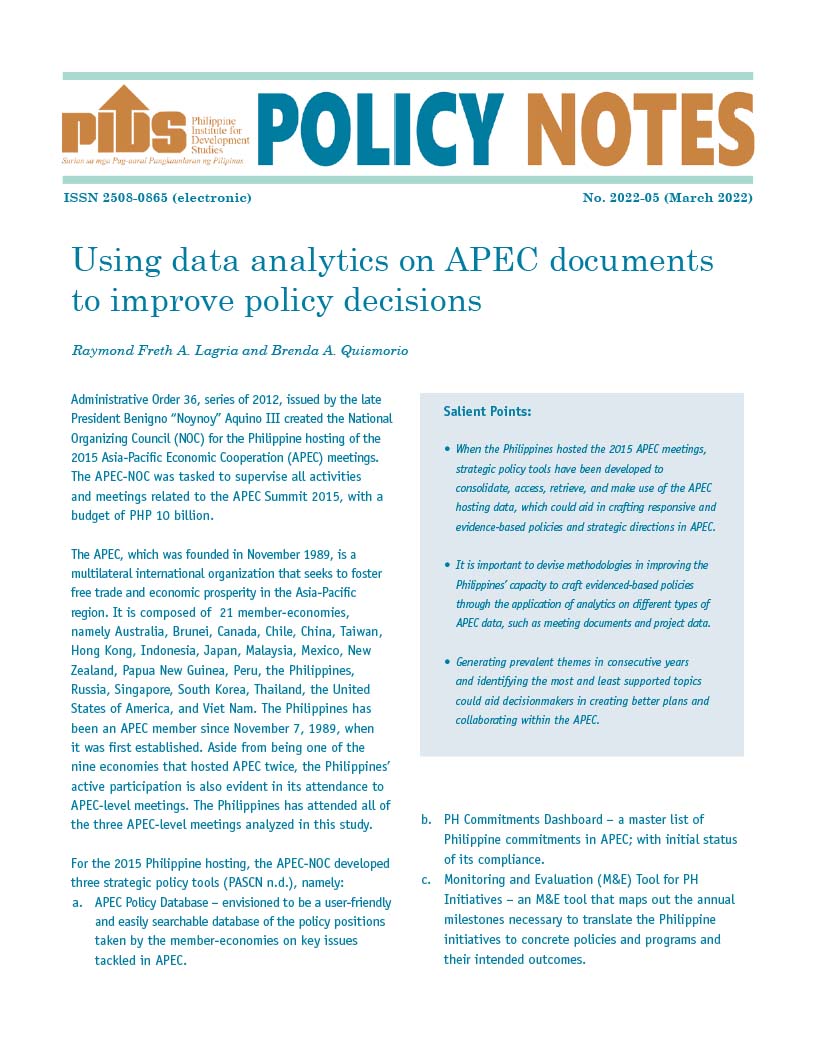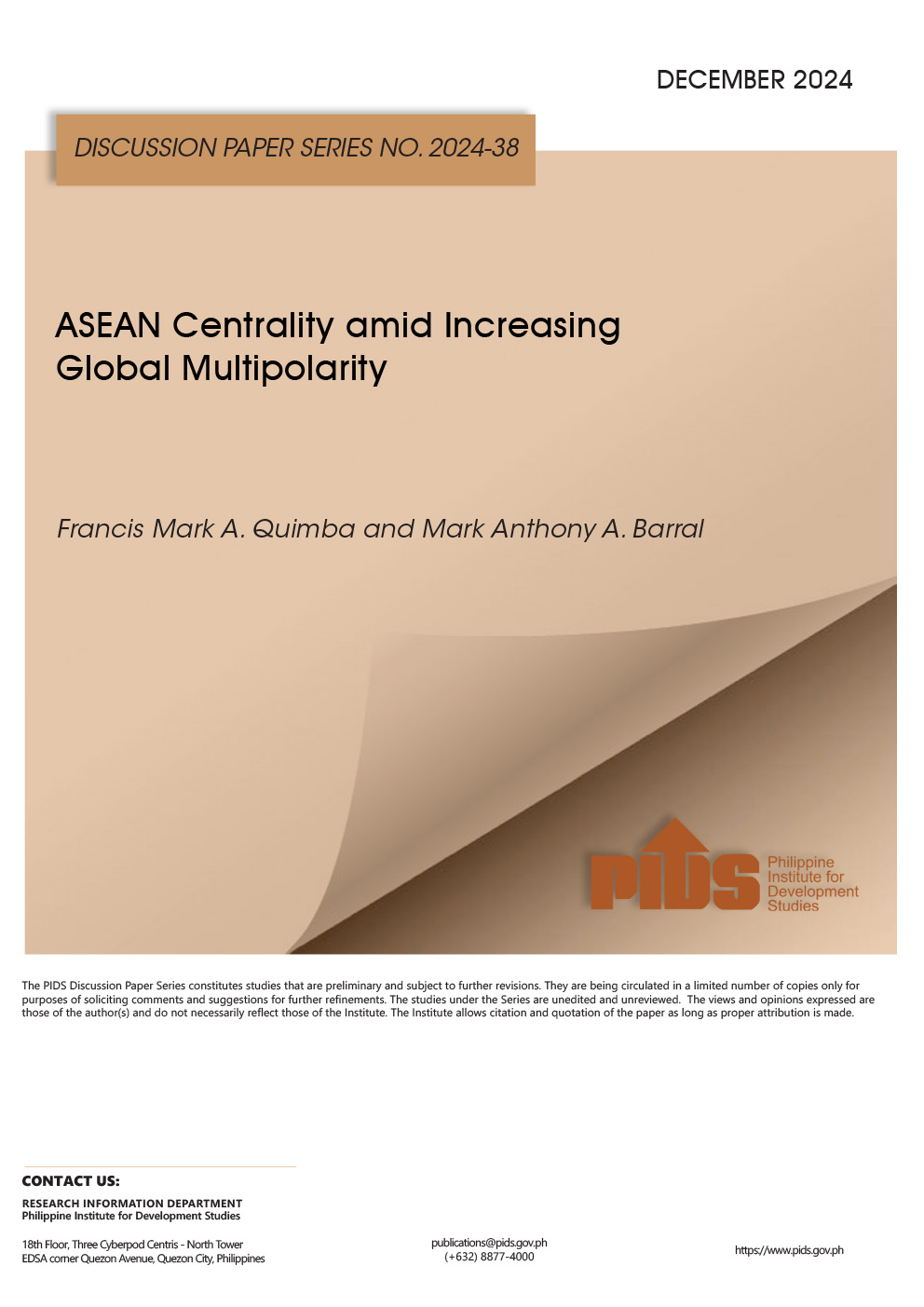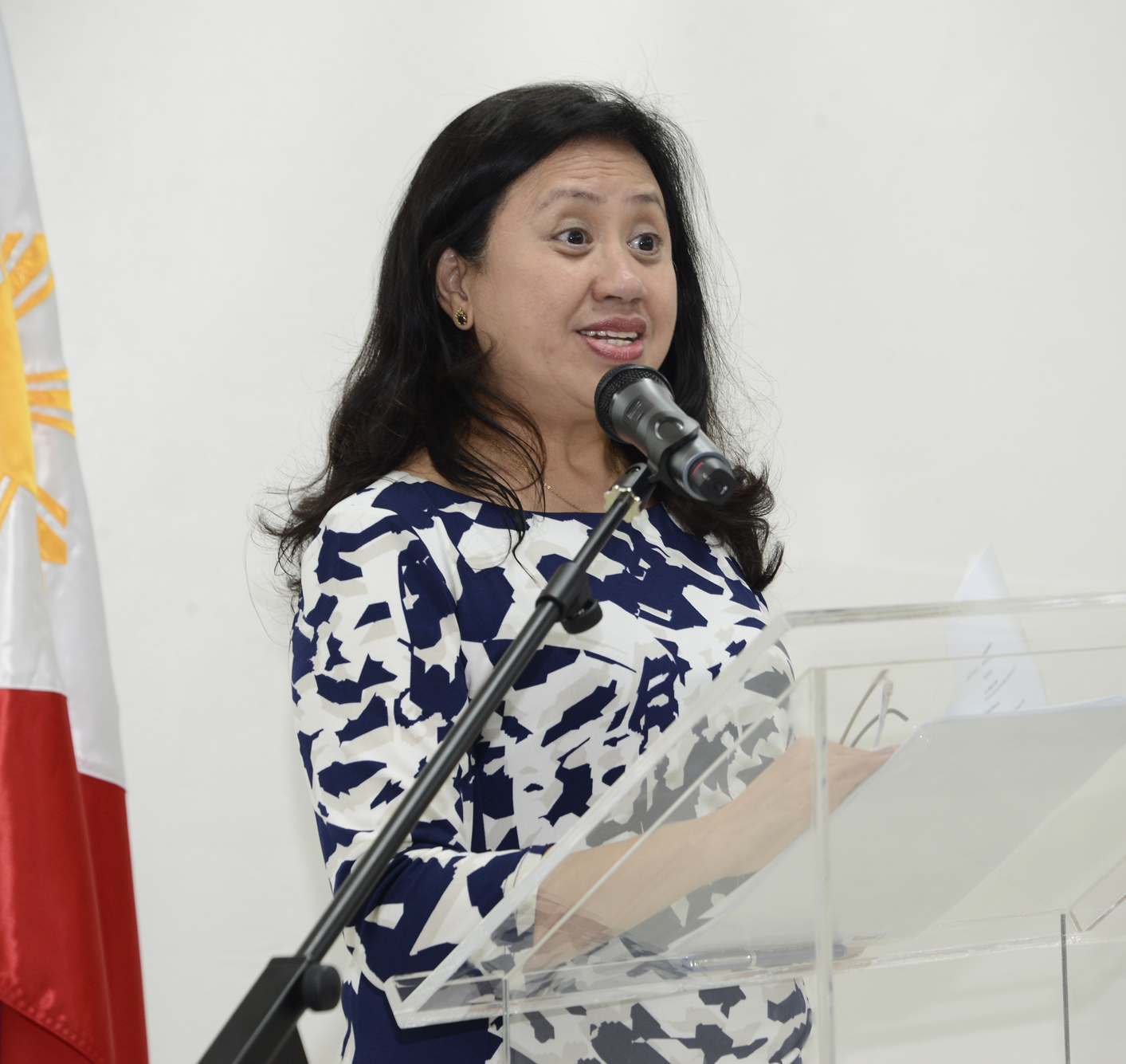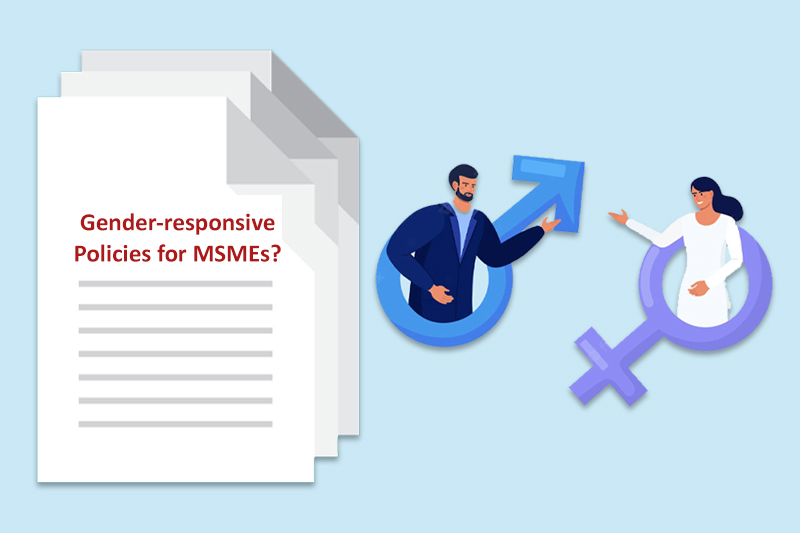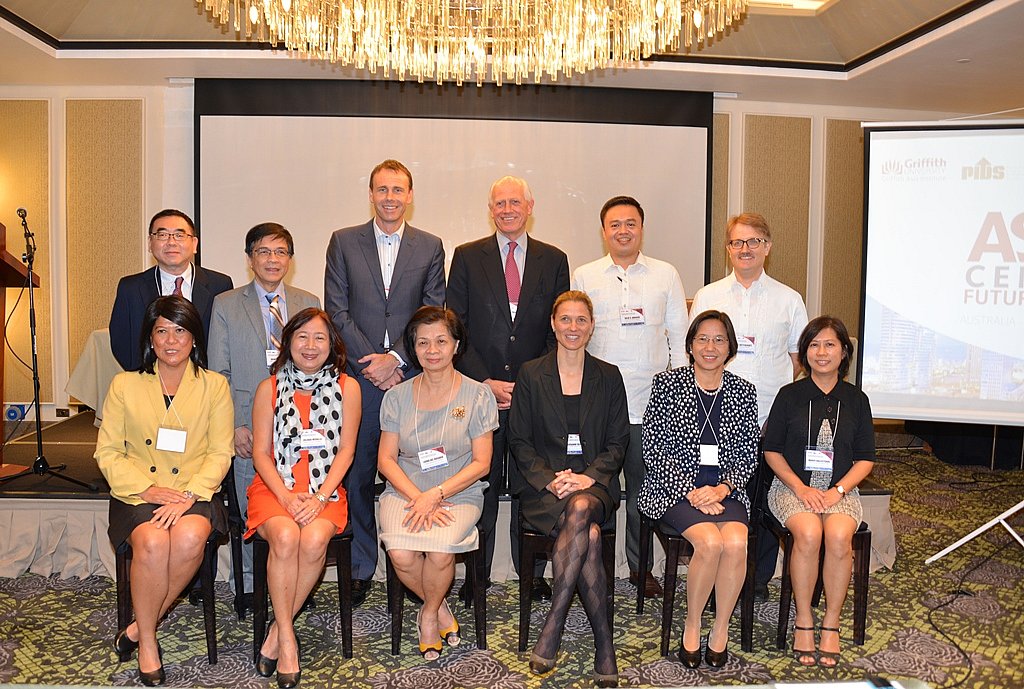
State think tank Philippine Institute for Development Studies (PIDS) and Griffith Asia Institute (GAI) of Griffith University held a forum focusing on building stronger economic partnership, disaster risk mitigation, and women empowerment - issues of mutual interest to both the Philippines and Australia.
With the theme "Economic Diplomacy and the APEC Agenda", PIDS and GAI hoped this policy dialogue could contribute in raising awareness of the strong economic partnership between the two countries, and in identifying new areas of cooperation. Both PIDS and GAI are members of the APEC Study Center Consortium that provide opportunities for collaborating in research on APEC issues.
In his opening statement, PIDS President Dr. Gilberto Llanto said PIDS and GAI could work together in producing policy relevant research on a range of development issues, namely innovative resilience and disaster response, and regulatory reforms.
Climate change is one area of sustainability that is prioritized by the Australian agenda that the two countries can continue to work on together.
"We could learn from Australia’s experience in disaster funding in the context of its advanced governance systems. For a country perennially beset by disasters, it is important for the Philippines to develop resilient systems that have the capacity to mitigate adverse shocks, to rebuild after shocks, and to move forward," Llanto added. .
Professor Russell Trood, Director of the GAI, remarked that it was a pity most people in Australia and the Philippines normally do not think of each other first when it comes to regional cooperation despite having plenty of common interests.
Towards that goal the GAI, according to Trood, has run a series of policy dialogues with several Asian countries over a wide range of issues.
Australia and the Philippines have already built collaborative linkages in the areas of policy, disaster preparedness, the Mindanao Peace Process, and governance reforms. Beyond government, there has also been an observable increase in the amount of people to people relationship, from academic and professional linkages to tourism.
Ambassador Laura Del Rosario, Foreign Affairs Undersecretary for International Economic Relations, buffed up the testimonials for Australia’s record in the Philippines.
"Australia is a moving force," she claimed upon recalling that Australia was the first to broach the idea of APEC.
Meanwhile, Deputy Head of Mission of the Australian Embassy-Philippines Dr. David Dutton said that the Philippines is at an interesting time in its history.
"The passing of several governance reforms and the continued economic growth averaging at six percent have signified the country’s commitment and readiness to move forward. Australia intends to find out how it can be part of the Philippines’ path to progress," Dutton said.
The discussions focused on strengthening economic diplomacy between the Philippines and Australia as well as on the APEC 2015 Agenda on building resilient communities and empowering women. The sterling roster of speakers included Paul Hutchcroft, lead governance specialist from the Australian Embassy in the Philippines, Hon. Joey Salceda, governor of Albay, and Ms. Pacita Juan, president of the Women’s Business Council of the Philippines.
On economic diplomacy
Australia continues to work with the Philippines by focusing its new aid policy on enhancing foundations for economic growth through infrastructure, building stronger institutions for good governance, and participating in issues on peace and stability.
In his presentation, Hutchcroft illustrated the bilateral relations between the Australia and the Philippines. In terms of trade, Hutchcroft stated there are over 200 Australian companies currently in the Philippines. Australian direct investment, which is mainly in information technology-business process management, mining, and oil and gas exploration, has doubled since 2010. Two-thirds of Australian exports to the Philippines are metal ores and food products. The Philippines, on the other hand, exports services in manufacturing, tourism, and education.
Hutchcroft likewise highlighted the areas where the Philippines needs to improve. "Anyone who has worked in the Philippines knows that the country is notorious for underspending. The Philippines also has to resolve issues like providing access to basic resources in rural areas," he commented. He also emphasized the role of knowledge transfer, underscoring how increased information and knowledge exchange can help in these areas, as well as areas like developing small and medium enterprise access to finance, infrastructure, and disaster reduction and risk management.
Dr. Myrnia Austria, professor at De La Salle University, concluded that the main challenge for a country that has experienced significant growth is sustaining that growth and making it more inclusive. Dr. Tapan Sarker, a research fellow at the Griffith Asia Institute, reckoned that the Philippines and Australia are on the right path in choosing to address resources constraint together.
Australia and the Philippines share a strong history in the areas of security, having fought in World War II together. They are also engaged in bilateral exercises over issues like disaster recovery and rescue, defense and coast watch, and the building up of the Philippine’s institutional capacity together.
Mr. Julio Amador, deputy director-general of the Foreign Service Institute of the Department of Foreign Affairs encouraged both countries to deepen their cooperation level through enhanced consultations and more regular meetings between ministers over these issues.
On disaster risk reduction and resilience
Albay Governor Joey Salceda painted the picture of disaster risk reduction and resilience and climate at a local level.
Salceda explained that Albay’s priority development agenda is characterized by transformative polices and program, a green economy, and the integration of disaster resilience and risk reduction into the cultural fabric.
"Disaster risk reduction in Albay is as ordinary as going to the bathroom," said Salceda, who urged policymakers to prioritize the principle of building better, instead of building back better. Albay’s policy decision and program planning framework are all based on scientific evidence and rigorous risk assessment.
But beyond the planning aspect, Salceda added, "The only chance for reforms to take root is if they trust their government."
All sectors in Albay have been nurtured to work together. Dr. Susanne Becken from GAI explained in her discussion how a well-coordinated inter-sectoral action can help create a more resilient industry in all levels of the community.
In the tourism industry, according to Becken, there are four classic levels where disaster response and risk reduction should be improved to make any disaster policy or program effective. Tourists, businesses, destination countries, and national planning must all reflect an alignment of efforts to be able to fully carry out disaster response, resilience, and recovery.
Collaboration for inclusive growth
In the final session of the forum, Pacita Juan of Women’s Business Council of the Philippines, explored different case studies showing how empowerment of women can evidently make economic growth more inclusive. Empowerment must go beyond improving women’s access to finance, according to Juan. It is important to teach women in business how to make decisions about their finances.
Juan added that leaving women out of the growth machine is a shame because women lead most startups. These are businesses that start out with very little capital. The challenge lies in enabling them to scale up. Local government units have to be guided in creating a more encouraging business environment, as women face more traditional restrictions that are harder to regulate, such as their reproductive role.
Ms. Luzviminda Villanueva, program manager of the Gender-Responsive Economic Actions for the Transformation of Women (GREAT Women) Project II, says the key aspects in creating a more inclusive business environment are in government policies, and in strengthening the decisionmaking capabilities of women.
Not everyone is into business, and not everyone in business knows what to do to succeed, said Villanueva. What civil society, the government, and the business sector can do is converge and align their policies and programs. ##
If you wish to know more about the studies presented at the forum, please click here
With the theme "Economic Diplomacy and the APEC Agenda", PIDS and GAI hoped this policy dialogue could contribute in raising awareness of the strong economic partnership between the two countries, and in identifying new areas of cooperation. Both PIDS and GAI are members of the APEC Study Center Consortium that provide opportunities for collaborating in research on APEC issues.
In his opening statement, PIDS President Dr. Gilberto Llanto said PIDS and GAI could work together in producing policy relevant research on a range of development issues, namely innovative resilience and disaster response, and regulatory reforms.
Climate change is one area of sustainability that is prioritized by the Australian agenda that the two countries can continue to work on together.
"We could learn from Australia’s experience in disaster funding in the context of its advanced governance systems. For a country perennially beset by disasters, it is important for the Philippines to develop resilient systems that have the capacity to mitigate adverse shocks, to rebuild after shocks, and to move forward," Llanto added. .
Professor Russell Trood, Director of the GAI, remarked that it was a pity most people in Australia and the Philippines normally do not think of each other first when it comes to regional cooperation despite having plenty of common interests.
Towards that goal the GAI, according to Trood, has run a series of policy dialogues with several Asian countries over a wide range of issues.
Australia and the Philippines have already built collaborative linkages in the areas of policy, disaster preparedness, the Mindanao Peace Process, and governance reforms. Beyond government, there has also been an observable increase in the amount of people to people relationship, from academic and professional linkages to tourism.
Ambassador Laura Del Rosario, Foreign Affairs Undersecretary for International Economic Relations, buffed up the testimonials for Australia’s record in the Philippines.
"Australia is a moving force," she claimed upon recalling that Australia was the first to broach the idea of APEC.
Meanwhile, Deputy Head of Mission of the Australian Embassy-Philippines Dr. David Dutton said that the Philippines is at an interesting time in its history.
"The passing of several governance reforms and the continued economic growth averaging at six percent have signified the country’s commitment and readiness to move forward. Australia intends to find out how it can be part of the Philippines’ path to progress," Dutton said.
The discussions focused on strengthening economic diplomacy between the Philippines and Australia as well as on the APEC 2015 Agenda on building resilient communities and empowering women. The sterling roster of speakers included Paul Hutchcroft, lead governance specialist from the Australian Embassy in the Philippines, Hon. Joey Salceda, governor of Albay, and Ms. Pacita Juan, president of the Women’s Business Council of the Philippines.
On economic diplomacy
Australia continues to work with the Philippines by focusing its new aid policy on enhancing foundations for economic growth through infrastructure, building stronger institutions for good governance, and participating in issues on peace and stability.
In his presentation, Hutchcroft illustrated the bilateral relations between the Australia and the Philippines. In terms of trade, Hutchcroft stated there are over 200 Australian companies currently in the Philippines. Australian direct investment, which is mainly in information technology-business process management, mining, and oil and gas exploration, has doubled since 2010. Two-thirds of Australian exports to the Philippines are metal ores and food products. The Philippines, on the other hand, exports services in manufacturing, tourism, and education.
Hutchcroft likewise highlighted the areas where the Philippines needs to improve. "Anyone who has worked in the Philippines knows that the country is notorious for underspending. The Philippines also has to resolve issues like providing access to basic resources in rural areas," he commented. He also emphasized the role of knowledge transfer, underscoring how increased information and knowledge exchange can help in these areas, as well as areas like developing small and medium enterprise access to finance, infrastructure, and disaster reduction and risk management.
Dr. Myrnia Austria, professor at De La Salle University, concluded that the main challenge for a country that has experienced significant growth is sustaining that growth and making it more inclusive. Dr. Tapan Sarker, a research fellow at the Griffith Asia Institute, reckoned that the Philippines and Australia are on the right path in choosing to address resources constraint together.
Australia and the Philippines share a strong history in the areas of security, having fought in World War II together. They are also engaged in bilateral exercises over issues like disaster recovery and rescue, defense and coast watch, and the building up of the Philippine’s institutional capacity together.
Mr. Julio Amador, deputy director-general of the Foreign Service Institute of the Department of Foreign Affairs encouraged both countries to deepen their cooperation level through enhanced consultations and more regular meetings between ministers over these issues.
On disaster risk reduction and resilience
Albay Governor Joey Salceda painted the picture of disaster risk reduction and resilience and climate at a local level.
Salceda explained that Albay’s priority development agenda is characterized by transformative polices and program, a green economy, and the integration of disaster resilience and risk reduction into the cultural fabric.
"Disaster risk reduction in Albay is as ordinary as going to the bathroom," said Salceda, who urged policymakers to prioritize the principle of building better, instead of building back better. Albay’s policy decision and program planning framework are all based on scientific evidence and rigorous risk assessment.
But beyond the planning aspect, Salceda added, "The only chance for reforms to take root is if they trust their government."
All sectors in Albay have been nurtured to work together. Dr. Susanne Becken from GAI explained in her discussion how a well-coordinated inter-sectoral action can help create a more resilient industry in all levels of the community.
In the tourism industry, according to Becken, there are four classic levels where disaster response and risk reduction should be improved to make any disaster policy or program effective. Tourists, businesses, destination countries, and national planning must all reflect an alignment of efforts to be able to fully carry out disaster response, resilience, and recovery.
Collaboration for inclusive growth
In the final session of the forum, Pacita Juan of Women’s Business Council of the Philippines, explored different case studies showing how empowerment of women can evidently make economic growth more inclusive. Empowerment must go beyond improving women’s access to finance, according to Juan. It is important to teach women in business how to make decisions about their finances.
Juan added that leaving women out of the growth machine is a shame because women lead most startups. These are businesses that start out with very little capital. The challenge lies in enabling them to scale up. Local government units have to be guided in creating a more encouraging business environment, as women face more traditional restrictions that are harder to regulate, such as their reproductive role.
Ms. Luzviminda Villanueva, program manager of the Gender-Responsive Economic Actions for the Transformation of Women (GREAT Women) Project II, says the key aspects in creating a more inclusive business environment are in government policies, and in strengthening the decisionmaking capabilities of women.
Not everyone is into business, and not everyone in business knows what to do to succeed, said Villanueva. What civil society, the government, and the business sector can do is converge and align their policies and programs. ##
If you wish to know more about the studies presented at the forum, please click here

